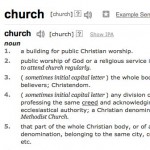God does not view your local church as distinct from other local churches in your area
So, I made a claim in the title of this post with which some will readily agree and with which some with just as readily disagree: God does not view your local church as distinct from other local churches in your area.
In Scripture, we do see examples of groups of believers meeting together regularly in certain locations. For example, Paul tells the Christians in Rome to greet the church in Prisca and Aquila’ house. (Romans 16:5) He also tells them to greet the brothers and sisters who were with Asyncritus, Phlegon, Hermes, Patrobas, and Hermas (Romans 16:14) and to greet the saints who were with Philologus, Julia, Nereus and Olympas. (Romans 16:15)
It seems clear from these greetings that Paul knew that these believers normally met together in some way. However, this does not mean that these groups of believers were distinct from one another. The very fact that Paul could address one letter to all of these believers and more indicates that he did not view them as distinct but somehow connected with one another.
This connection was not simply some kind of spiritual connection. Even today, people say, “Sure, we’re all part of the same church.” But, then, there is very little – if any – real indication or demonstration of this unity and fellowship. It is a unity in name only.
If you work with another brother or sister in Christ – spend most of your day in the same location as that person – then you are (in reality) part of the same church with them, whether or not the two of you recognize it and live it out and whether or not the two of you are part of the same “local church.” If you live next door to another brother or sister in Christ then you are (in reality) part of the same church with that person, whether or not the two of you recognize it and live it out and whether or not the two of you are part of the same “local church.”
We cannot choose to love, serve, teach, encourage, etc. those who are part of a certain “local church” but not recognize our responsibility and privilege of serving other brothers and sisters who are part of our lives but who may not be part of the same “local church” as us.
In reality, the modern concept of the “local church” – a concept and division of the church that began during the Reformation – is a division among the church that is outside the scope of Scripture. There is nothing in Scripture written specifically about or to the “local church” but the “local church” – as it is understood and practiced today – is not found in Scripture.
So, let’s not let the concept and boundaries set up by modern “local churches” separate us from brothers and sisters in Christ that God brings into our lives. We are responsible for one another in Christ, whether or not we are part of some “local church” organization together.
Different forms of participation
Michael at “2nd man united” is writing a series of posts called “What it means to be organic.” His third post in the series is “Moving Participation From Positions to People.”
In this series, Michael is comparing “mechanical order” to “organic order.” I think this is a helpful comparison, although certainly some will disagree with it. However, it is helpful when we see the differences in the topic being discussed.
For example, all believers think that participation is a good thing. But, often, we are talking about different things when we talk about “participation.” Michael writes:
In mechanical order, people are invited to participate by filling in positions in a master plan. For example, setting up ministry programs and asking for volunteers to serve in the ministries. In this case, leaders invite people to participate in ways that serve the plan. They are then inserted into the manufacturing process (program) with the intention that they are a piece that can help bring about the predetermined desired outcome…
In organic order, individuals are invited to participate as themselves for the good of the group as a whole. The mission (or ministry) emerges from how the individual participants grow together as a community and interact with the world around them given their competencies (spiritual gifts, natural talents, etc.). To be truly organic, community must take precedence above mission. This is the only way that the priority of the health of the individuals is kept front and center. If mission comes first, you sacrifice the health of the individuals for what they can do for the mission. Instead, the mission comes out of the improved health of the individuals. Plus, God’s eternal purpose is wrapped up in community. Community is the prime product. Mission is a by-product. (emphasis in original)
The difference, as Michael points out, is the form of participation. Are people required to participate with one another in set forms or methods that have been already set up as part of a plan? Or, are they free to participate as they are – that is, as God has gifted and prepared them?
Yes, in the “organic” form of participation, there is an increased likelihood of messiness. In the “mechanical” form of participation, things flow more smoothly.
Of course, I’m not convinced that “more smoothly” is better than “messier,” but that would probably be a good topic for another day.
Don’t misunderstand me… God can and does work through both mechanical participation and organic participation. However, I believe that organic participation is healthier for the church.
How have you seen God work through both mechanical and organic participation? Which form do you think is healthier for the church? Why?
Discipleship: Patience and Progress
You know, Jesus had to have a tremendous amount of patience. Think about it… he lived among a group of people (including twelve men he called apostles) for at least three years. They heard him speak, saw him heal, followed him from place to place, ate with him. In every circumstance and situation, he showed them what it meant to live in the kingdom of God.
Finally, they watched him die and spent 40 days with him after he was raised from the dead. Then, just as he was about to physically leave them – as he had told them he was going to do – they asked him, “Hey, Jesus, is this when you’ll finally usher in your kingdom?” (Alan’s paraphrase)
If it was me, I would have started over right then. I mean, everything Jesus did and said to show them and teach them about the kingdom of God, and they still didn’t get it. But, like I said, Jesus had a tremendous amount of patience, and he was willing to continue to work in these people – at least 120 in Jerusalem and perhaps as many as 500 in Galilee – through the Holy Spirit.
Of course, someone could argue that Jesus had so much patience with these earliest disciples because the Holy Spirit had not indwelled them yet. But, then, Paul comes along, and he also spends a long time with people helping them follow Jesus and live in the kingdom of God. True, at times, he only has a short time to spend with people in some cities. But, at other times, he spends up to 2 years helping people follow Jesus.
We can learn something important from this. Patience is necessary when we are helping other people follow Jesus as his disciples.
However, in the same way, I think we should expect progress – both from ourselves and from others. True, progress will be different with different people. God works differently in different people and different circumstances and different contexts. But, he does continue to work, and so we should see continuous progress.
This “progress” is referred to by many terms or phrases in Scripture. For example, Jesus and the authors of Scripture often pointed out that God’s children should “bear fruit.” “Fruit” is one indication of progress as a disciple of Jesus.
So, while we should definitely be patient with ourselves and with others, we should also expect to see progress in following Jesus.
Interestingly, what I’ve found (typically) is that we expect patience for ourselves and progress from others.
Do you think we should have patience in ourselves and others as we learn to follow Jesus? Do you think we should also see progress?
How do these two (patience with progress) affect the way we help others follow Jesus as his disciples?
Have you also noticed the tendency to request patience for ourselves but require progress from others? How can we work against this tendency?
Race Report from the Myrtle Beach Half Marathon
For the one or two of you who may be interested, I’ve written a “race report” about the Myrtle Beach half marathon which I ran last Saturday. You can find it at my running blog in a post called “Myrtle Beach Half Marathon Race Report.”
The report includes pictures and a short video that my wife recorded while I was running by near the start of the race. She continued recording after I ran by which gives you an idea of the numbers of people running that day.
Why can’t we work together for the gospel?
This morning, Dave Black posted a new essay called “Can We Please Do Church Planting Cooperatively?”
The post is about working together with “nationals” – i.e., working with people who already live in a certain area. For example, he and his wife work with Ethiopians in Ethiopia. I know… it sounds obvious, right?
But, this is not always the case.
At one point, he quotes from his new book Will You Join the Cause of Global Missions?:
Unfortunately [I continue], many U.S. mission teams fail to coordinate their efforts with the churches of host locations. Recently a student of mine mentioned that his local church was going to plant a new church in China. I asked him, “Have you ever considered simply going to China and asking the existing churches how you can come alongside them and help?” Failing to understand and connect with God’s already-at-work global purpose is one of the greatest mistakes we can make as churches. More and more local churches in America are forging effective partnerships with local churches in foreign nations, asking how they can best serve the needs in those countries. When done well, everybody benefits through this kind of beautiful partnership, and Christ is honored as His people submit to one another in love.
I wonder if one of the biggest reasons that we don’t work with others on “global missions” is because we don’t work with others on “local missions.” The church has become so sectarian that we tend to isolate ourselves, even (and especially) when it comes to gospel work.
The organization may not be the church, but the church may be there
When I write about the church, I usually begin by explaining that I am referring to the people of God as they gather together. The church is not an organization or some type of corporate or hierarchical entity or a denomination or anything like that. It’s not a building. It’s not a set of rules or beliefs or codes. It’s not an event or a service. The church (as the Greek term “ekklesia” signifies) is a gathering or assembly of God’s people.
Of course, at the time that the New Testament was written, the term “ekklesia” alone (without any other context) did not necessarily refer to an assembly of God’s people. It simply referred to a gathering or assembly of people. In different contexts and with different modifiers, the term could refer to many different types of gatherings from political to social to educational to occupational etc.
But, the Greek term “ekklesia” always referred to groups of people. Today, if we use the term “church” to refer to anything other than God’s people, then we are not using it in the same way that the New Testament authors used the term “ekklesia.”
But, let’s be honest. People use the English term “church” to refer to many different things. And, many times, the term is not used to refer to a group of people. Often, the term church is used to refer to a specific building. The building is NOT the church. But, the church may be gathered in that building from time to time.
Sometimes, the English term “church” is used to refer to a certain organization or corporation with bylaws and organizational leadership etc. This organization/corporation is not the church. But, the church may meet together under auspices of that organization.
The term “church” is often used to refer to a specific event or service. That event or service is not the church. However, the church may be present at that event.
Some denominations or others types of associations may refer to themselves with the English term church. These types of organizations are not the church. However, the church may affiliate with those denominations or organizations in certain ways.
So, I don’t always agree with the ways that people use the English term “church.” Of course, this is my personal concern since the English term “church” is not actually found in Scripture and has a much wider range of definitions than the Greek term “ekklesia” that it is often used to translate. [We had a good discussion about this in a post a few years ago when I asked the question, “Should we use the word ‘church’?“]
But, this post is not really about whether or not we should use the word “church” and it’s not even about whether or not people use the word “church” in a manner that is similar to the use of the term “ekklesia” in the New Testament.
Instead, the point of this post is this: even when people use the term “church” in a way that does not refer to a gathering of the people of God, the people of God are often there. This is the church. And, we should care about, love, serve, teach, encourage, etc. those who are gathered, regardless of how they use the term “church.”
We are all brothers and sisters in Christ, regardless of how we use the term “church.”
Scripture… As We Live It #196
This is the 196th passage in “Scripture… As We Live It.”
And the Lord called Samuel again the third time. And he arose and went to Eli and said, “Here I am, for you called me.” Then Eli perceived that the Lord was calling the boy. Therefore Eli said to Samuel, “Go, lie down, and if he calls you, you shall say, ‘Speak, Lord, for your servant hears.'” you shall read the Scriptures for that is the only way that God will speak to you.” (1 Samuel 3:8-9 re-mix)
(Please read the first post for an explanation of this series.)
Replay: Follow Jesus to do WHAT?
I first published the post “Follow Jesus to do WHAT?” four years ago when we were studying the Gospel of Matthew. I noticed some patterns in the things that Jesus did and the things that he then sent his followers out to do. Perhaps, “following Jesus” or being a “disciple of Jesus” means doing these same kinds of things.
What do you think?
————————–
Follow Jesus to do WHAT?
As I’ve mentioned previously, we’re studying through the Gospel of Matthew, with different brothers teaching through the passages on Sunday mornings when the church meets (see the posts “What’s with the begats?“, “Baptized with the Holy Spirit and with fire“, “A Sympathetic High Priest“, and “Playing with Blocks“). Next Sunday, Mael is planning to teach through the end of chapter 4 of Matthew. As our family has discussed this passage before our Sunday meeting, we’ve noticed something interesting.
First of all, in Luke’s Gospel, he says the following about the start of Jesus’ public ministry:
And Jesus returned in the power of the Spirit to Galilee, and a report about him went out through all the surrounding country. And he taught in their synagogues, being glorified by all. And he came to Nazareth, where he had been brought up. And as was his custom, he went to the synagogue on the Sabbath day, and he stood up to read. And the scroll of the prophet Isaiah was given to him. He unrolled the scroll and found the place where it was written, “The Spirit of the Lord is upon me, because he has anointed me to proclaim good news to the poor. He has sent me to proclaim liberty to the captives and recovering of sight to the blind, to set at liberty those who are oppressed, to proclaim the year of the Lord’s favor.” And he rolled up the scroll and gave it back to the attendant and sat down. And the eyes of all in the synagogue were fixed on him. And he began to say to them, “Today this Scripture has been fulfilled in your hearing.” (Luke 4:14-21 ESV)
Thus, according to Jesus, part of the reason that he came was to fulfill this prophecy. It is interesting that Matthew does not include this prophecy in his Gospel, especially since Matthew seems very interested in showing that Jesus is the fulfillment of the Law and the Prophets.
In Matthew 4, the evangelist begins by telling about the temptation of Jesus. Next, he says that Jesus called Andrew, Peter, James, and John to follow him. Then, notice the passage at the end of Matthew chapter 4:
And he went throughout all Galilee, teaching in their synagogues and proclaiming the gospel of the kingdom and healing every disease and every affliction among the people. So his fame spread throughout all Syria, and they brought him all the sick, those afflicted with various diseases and pains, those oppressed by demons, epileptics, and paralytics, and he healed them. And great crowds followed him from Galilee and the Decapolis, and from Jerusalem and Judea, and from beyond the Jordan. (Matthew 4:23-25 ESV)
So, while Matthew does not specifically quote Isaiah, and while Matthew does not specifically say that Jesus fulfills Isaiah’s prophecy, Matthew actually demonstrates that Jesus did fulfill the prophecy. In Luke (Isaiah), we see that Jesus says that he is going to proclaim the good news. In Matthew, we see Jesus actually proclaiming the good news. In Luke (Isaiah), we see that Jesus says that he is going to care for the blind and oppressed. In Matthew, we see Jesus actually healing the sick and casting out oppressive demons.
But, I think we n
I am running the Myrtle Beach Half Marathon this morning
I’ve scheduled this post earlier than normal. I usually publish my first post of the morning at 9:00 a.m. However, this post will be published at 6:30 a.m.
Why? Because the Myrtle Beach Marathon and Half Marathon start at 6:30 a.m.
It will probably take me a few minutes to reach the start line, since there are thousands of people running this race. So, if you read this immediately after it is published, then you may be reading before I actually start running. But, for most of you, you will read this while I am running or after I finish the race.
I have two goals for this race. My primary goal is to finish the race. I have run 13.1 miles before (half marathon distance), but never in a race. So, if I finish, this will be a big accomplishment for me, especially since I couldn’t run at all last summer.
My secondary goal is to finish the race in under 2 hours. That means that I will need to run all 13.1 miles at a pace of around 9 minutes per mile. I’ve run just over 9 miles at that pace. But, when I ran 13.1 miles before, I ran slower that than pace. So, again, if I finish in under 2 hours, this will be another great accomplishment for me. In early fall, I was running much shorter distances at a pace of 12 minutes per mile.
Plus, because of this race, I’m able to spend a long weekend with my wife, Margaret. My parents, Margaret’s parents, and some good friends of ours helped make this weekend possible, and we are greatly appreciative!
It’s not that you’re corrupt; it’s that they don’t know you
Have you heard any complaints about “this generation” lately? Have you heard that they have little or no respect for authority? Have you heard that they have problems with committing to church? Haven’t heard that? Well, I have. And, I hear it often.
But, there’s a problem with these complaints. They’re not true. Seriously. They’re not true.
This generation (whichever generation the author, blogger, pastor, etc. may be talking about) does respect authority, and they do not have a problem committing.
However, they have very little respect or commitment for nameless, faceless entities. Over the last 20 years or so, people have grown up watching commercials telling them that product X is the best, fastest, easiest, cheapest, etc. They knew these claims were not true. They heard politicians telling them that they had their best interests in mind. They knew these sound bites were not true. They heard CEO’s telling them that the employees were the company’s most important asset. They knew this was not true.
How did they know these things were not true? Because it didn’t prove to be true. The products failed. The politicians lied. The CEO laid off half the work force and took a huge bonus.
All of these people (product spokespeople, politicians, and CEO’s) all had something in common. The people did not really know them. They knew the names and faces, but they didn’t know the people themselves.
They did not truly know the actor pitching the product, or the congressman/senator making promises, or the CEO collecting bonuses. And, they learned that they could not trust someone just because they were in a certain position of influence. They learned that just because a person said something, it did not make it true. In fact, they learned that the more someone said something and the more force that was used to convince people that it was true, the more likely the it was not true.
So, where does that put the church in the view of “this generation”? Well, it depends.
Do the people actually know the person (people) who are speaking? I’m not asking if they know what the person (people) say about himself, herself, or themselves. I’m not asking if they know what the person says. I mean, do they actually KNOW that person. If not, then to “this generation” the person speaking is the same as the product spokesperson, the company’s CEO, the politician, the college president, etc.
If the people do not know you, they will probably not trust you. This is different than previous generations to whom people in positions of authority were automatically assumed to be trustworthy. “This generation” has learned otherwise; people are not trustworthy simply because of their position or because they say that they are trustworthy.
This does not mean that you are corrupt. It does not mean that you are lying. It does not mean that you are not authentic in what you say about yourself. It means that they do not KNOW any of this about you, because they will not believe it simply because you say it’s so.
So, do you want people in “this generation” to trust you? Do you want to be able to influence them? Do you want them to be committed to fellowship and community with you? Then, you must share your life with them… actually share your life.
The times when you stand above them and speak, teach, preach, sermonize alone will not count in their eyes.
Does your context not allow for any other kind of sharing lives together? Well, you have a problem, don’t you?










